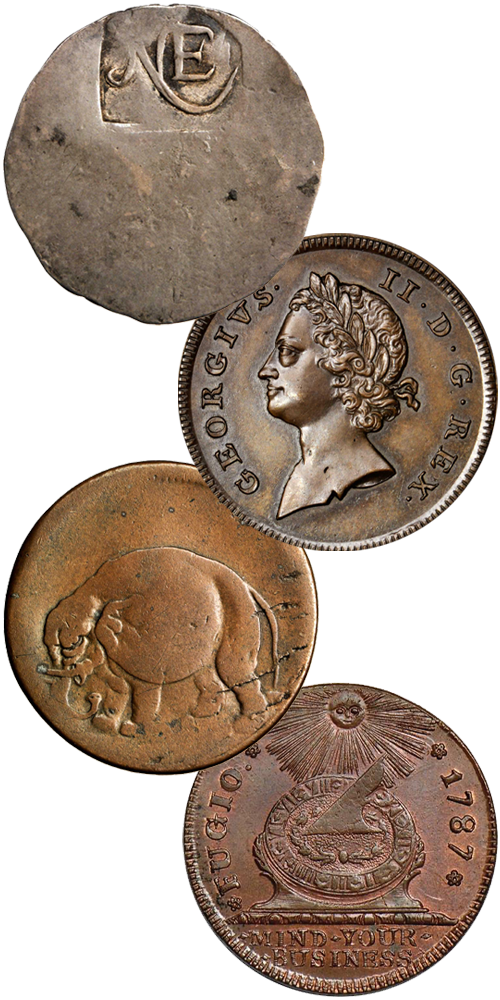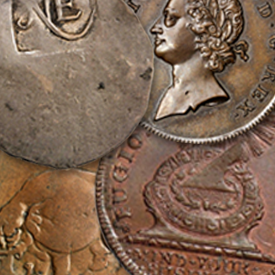The field of Colonials is quite diverse and covers everything struck in, struck for, or circulating in North America prior to 1793 as well as a few pieces struck outside the mint through the early 19th century. While the majority of colonial coins are made from copper, a few silver pieces were struck and even fewer gold pieces. The field of Colonials is easiest understood if it is broken into several sub-fields. Most collectors who undertake this field specialize in only a few of these areas as attempting to collect all colonials is beyond the pocketbooks of all but a very few. In addition, a number of colonial coins are extremely rare, and opportunities to acquire some of these occur only once every few decades, if that.
As silver and gold were quite precious and rare in the colonies, much of the circulating coinage during the colonial period was of foreign origin, most notably Spanish reales and escudos, most all of which were struck in Mexico and South America. The majority of copper coins struck in the colonies were useful for “small change” and little else. It was not until the Coinage Act of 1857 that Spanish silver coins were finally retired from circulation.
The following is an outline of the various areas within the realm of colonial coinage, with a few common examples listed under each. Of course, far more issues than those listed below exist.
1. British New World – This includes the famous “New England” coinage of three, six and twelve pence (shilling) coins in silver.
a. Sommer Islands
b. Lord Baltimore coinage
c. “New England” coinage: “NE”, Willow, Oak, Pine Tree
2. British Royal Patent – These were typically minted in England, and then exported either to Ireland or the American colonies.
a. Rosa Americana
b. Woods Hibernia
c. Virginia Halfpennies
3. French New World – While intended for the French colonies (Newfoundland, Acadia, French West Indies and New France) these are generally included in the American colonial field.
4. Early American Tokens – Mostly farthing and half penny size, these bore no denomination and sometimes circulated as small change.
a. Elephant Tokens
b. Voci-Populi
c. Pitt Tokens
5. Speculative Issues and Early Patterns – These were proposed ideas for coinage made during the 1780s. The Fugio cents were struck in quantity and were the first coins authorized under U.S. authority. The famous “Continental Dollar” of 1776 is included in this group.
a. Nova Constellatio
b. Immune Columbia
c. Fugio Cents
6. State Coinage – Copper pieces were issued by several states (or colonies at the time) the most prolific of which are listed below though others struck coins as well.
a. Massachusetts
b. Connecticut
c. New Jersey
7. Later Private Tokens – Struck in the late 1780s and 1790s, these were largely promotional, privately-issued tokens which briefly served as a local medium of exchange.
a. Talbot, Allum and Lee
b. Bar Cent
c. Kentucky Tokens
8. Washington Pieces (1783-95) – George Washington was widely admired during his lifetime, and was the subject of numerous honorary medals and coins.
a. Georgius Triumpho
b. Washington Independence
c. Washington President
9. Patterns of 1792 – Prior to the Philadelphia mint’s opening in 1793, patterns for cents, half dismes, dismes and quarters were made. The half disme was struck in quantity, and is today widely regarded as a regular issue, though it was struck outside the mint.
a. Silver Center Cent
b. Half Disme
c. Disme
Colonial coins have tremendous appeal to those interested in early American history. They are tangible artifacts of the very birth of the nation, and their variety, primitive appearance and historical significance offer the collector something not found in many later issues.







